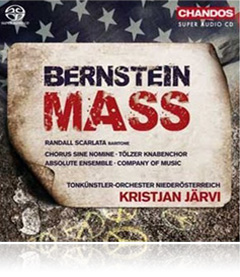| May 1, 2009
Ultra Sounds: Multichannel Bernstein
 Bernstein: Mass Bernstein: Mass
Randall Scarlata, baritone; Company of Music, Tölzer Knabenchor, Chorus Sine Nomine,
Tonkünstler-Orchester, Absolute Ensemble; Kristjan Järvi, conductor.
Chandos CHSA 5070 (2 multichannel SACD/CDs).
As far as high-resolution recording goes, the industry
seems to be headed in the direction of digital downloads. This is all well and good, but
there’s one thing that digital delivery has not adequately addressed, and that’s
the issue of multichannel surround sound. Maybe most listeners don’t want it; it
seems that every time an audio-only format has tried to incorporate surround sound, that
format has faltered or folded. This is odd, when you consider the interest in surround
sound for home theater, where multichannel sound is required.
Some music, however, if it is to be appreciated as the
composer intended it, requires surround sound. Most know about the Berlioz Requiem,
with a different brass choir in each quadrant of the performance venue. I heard such a
performance at the Washington National Cathedral, and the Dies Irae really did
sound like the wrath of God. Two-channel reproduction can give one an idea of how this
ought to sound, but can’t actually reproduce it. Before Berlioz, there were
antiphonal motets by many composers, most notably Praetorius and Gabrieli, that gain in
their effects by having four or more antiphonal choirs at various positions around the
listener.
One composition that’s usually overlooked as a
must-hear in surround is Leonard Bernstein’s Mass. The controversial work was
written for the opening of the Kennedy Center Opera House in Washington, DC, in 1971. At
the time I was a member of a music critics’ association, and so was privileged to
attend that event. After the lights went down, we were assailed by recorded music played
from the four corners of the house, blasting out a Kyrie eleison that grew more
involved and cacophonous as it went along. Then, suddenly, all the noise was swept away by
a single singer and guitar at front center stage, intoning:
Sing God a simple song:
Laude, Laude . . .
Make it up as you go along:
Laude, Laud . . .
Sing like you like to sing.
God loves all simple things,
For God is the simplest of all.
The impact of all that busy music being banished by a
simple guitar chord still gives me chills, but it was only the first of the many moments
of genius that fill a work best described as music drama. Recorded music returned
several times in the Mass, notably in the Second Introit and at the end of
the Agnus Dei, which builds to an almost unbearably powerful climax that leads to a
15-minute mad scene for the celebrant, in which he decries and denies all the trappings of
religion, which have been layered on bit by bit throughout the main portion of the work.
All of this is just too big for just two channels,
especially when we have a format that can reproduce it in more: SACD. Fortunately, Chandos
Records doesn’t know that the SACD is generally considered dead, and has issued a
definitive recording of Mass on two discs. It is a total triumph, and comes as
close as possible to re-creating the sound and scope of the original performance, while
also providing a demonstration disc for audiophiles. My compliments to producer Phillip
Traugott, executive producer Johannes Neubert, and balance engineer and surround mixer
Josef Schütz, for engineering this project with such genius and inspiration.
But so much technical expertise would come to naught
without a great performance, and we have that here as well. Kristjan Järvi, the youngest
maestro in that family of conductors, leads mostly European forces in a reading that
sounds thoroughly American. This performance really shows what an international arts
community we have become. It realizes all of the musical styles used by the eclectic
Bernstein, from rock and Broadway to the concert hall, and makes them work together as a
unique whole. I have admired Mass from its very first performance, but never more
so than in this superb recording.
The use of the obvious quadraphonic effects is not the sole
reason for this being a special disc. Mass is scored for a huge number of singers
and players, and the upfront sound is exemplary for its clarity and presence, whether the
sound is loud and brash (Gloria) or delicate and intimate (The Lord’s
Prayer). Bernstein threw everything into this work -- a vibraphone and a xylophone
play together at one point, and there is much exotic percussion at other junctures -- but
one is never in doubt as to what is happening musically. Stage width and depth are most
impressive, and balances are perfect from beginning to end.
Some write off Mass as trite trash; I see it as
singular masterpiece. That’s also the way I see this recording. Perhaps some day it
will be available as a multichannel download; for now, these two SACD/CDs are well worth
searching out.
. . . Rad Bennett
radb@ultraaudio.com
|